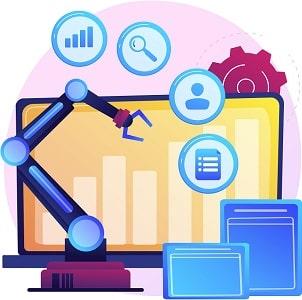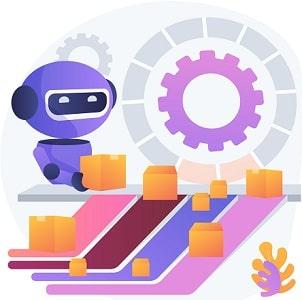Robotic Process Automation (RPA) is a technology that allows organizations to automate repetitive and routine tasks by using software robots to perform them without human intervention.
It leverages artificial intelligence (AI) and machine learning (ML) to automate complex processes and workflows that previously required human involvement.
This leads to increased efficiency, reduced costs, and improved accuracy, as the software robots can complete tasks 24/7 without the risk of human error.
How Robotic Process Automation Used in Industry
 RPA (Robotic Process Automation) leverages AI by incorporating cognitive technologies such as machine learning and natural language processing to automate repetitive, manual tasks.
RPA (Robotic Process Automation) leverages AI by incorporating cognitive technologies such as machine learning and natural language processing to automate repetitive, manual tasks.
AI algorithms help RPA bots perform decision-making and pattern recognition tasks, making them more adaptable and efficient.
By combining AI with RPA, organizations can achieve greater accuracy, speed, and scalability in their automation processes, leading to increased productivity and cost savings.
Related: ETL Data Integration Trends to Keep an Eye
RPA Development Services
RPA Development Services refer to the services offered by companies or consulting firms to help businesses design, build, and implement robotic process automation (RPA) solutions for their operations. These services may include:
#1. Assessment and planning:
Identifying areas for automation, determining the scope of RPA implementation, and creating a project plan.
#2. Design and development:
Building the RPA solution includes the design of workflows, automating tasks, and testing the solution.
#3. Implementation and deployment:
Installing and integrating the RPA solution with existing systems and processes.
#4. Maintenance and support:
Providing ongoing technical support, bug fixing, and updates to ensure the RPA solution remains effective.
#5. Training:
Training end-users and IT staff to ensure they understand how to use and maintain the RPA solution.
These services help organizations achieve process automation, improve efficiency and productivity, and reduce costs.
Related: 9 Best Automation Testing Tools
What is the future of RPA in the IT industry?
 The future of RPA (Robotic Process Automation) in the IT industry is expected to be very bright.
The future of RPA (Robotic Process Automation) in the IT industry is expected to be very bright.
As organizations continue to automate repetitive and manual tasks, the demand for RPA solutions is expected to increase, leading to more technological innovations and advancements.
RPA’s potential to improve efficiency, reduce costs, and enhance the customer experience will also drive its widespread adoption across various industries.
The integration of RPA with other emerging technologies like AI and ML will fuel its growth and lead to more advanced and sophisticated automation solutions.
Related: Best Online Tutoring Software Providers
Robotic Process Automation in Banking
 Robotic Process Automation (RPA) has been gaining much traction in the banking industry.
Robotic Process Automation (RPA) has been gaining much traction in the banking industry.
RPA can be used in various areas of banking operations, such as account opening, loan processing, fraud detection, and customer service.
It can automate repetitive and manual tasks, reducing errors and increasing efficiency. This leads to an improved customer experience, reduced operational costs, and increased operational capacity.
Additionally, RPA can help banks comply with regulatory requirements and mitigate the risk of fraud by automating compliance-related tasks.
As RPA technology continues to evolve, it is expected to play a significant role in shaping the future of banking and financial services.
Related: How Cyber Security Software Services Help to stop Cyber Security Breaches
Robotic Process Automation in Financial Services
 Robotic Process Automation (RPA) has been widely adopted in financial services.
Robotic Process Automation (RPA) has been widely adopted in financial services.
RPA can automate data entry, reconciliation, fraud detection, and customer service tasks. This leads to improved efficiency, reduced costs, and increased operational capacity.
Additionally, RPA can help financial service providers comply with regulatory requirements and reduce the risk of fraud by automating compliance-related tasks.
In the future, integrating RPA with other emerging technologies, such as artificial intelligence and machine learning, will lead to more advanced and sophisticated automation solutions in the financial services industry.
Overall, RPA is expected to significantly transform financial services, improve processes, and drive business growth.
Related: How Automation Could Improve your Expense Management System
Robotic Process Automation in BPO
Robotic Process Automation (RPA) in BPO refers to using software robots or artificial intelligence (AI) tools to automate repetitive, routine, and manual tasks in outsourcing business processes.
This technology can improve efficiency, reduce errors, and lower costs for BPO companies while freeing human workers to focus on higher-value tasks requiring human skills and expertise.
Related: Tips To Buy Automate Workflow Management Software
Examples of tasks that can be automated with RPA in BPO include data entry, document processing, and customer service.
Benefits of Robotic Process Automation
#1. Increased efficiency and productivity:
RPA automates repetitive, manual tasks, freeing employees to focus on more value-adding activities.
#2. Reduced costs:
By automating manual tasks, RPA reduces labour costs and increases operational efficiency.
#3. Improved accuracy:
RPA eliminates the potential for human error, leading to increased accuracy in tasks such as data entry and record-keeping.
#4. Enhanced compliance:
RPA can help organizations comply with regulatory requirements by automating compliance-related tasks and providing a clear audit trail.
#5. Improved customer experience:
RPA can help organizations improve the speed and quality of their customer service by automating tasks such as data retrieval and query resolution.
#6. Scalability:
RPA allows organizations to quickly and easily scale up or down their automation efforts to meet changing business needs.
#7. 24/7 operation:
RPA bots can work around the clock without taking breaks or time off, increasing the speed and availability of tasks.
Related: How Personal Contact Management Software Save Time?
How Robotic Process Automation is Useful in Software Development
#1. Automating repetitive tasks:
RPA can automate tasks such as data entry, testing, and bug reporting, freeing RPA Developers to focus on more strategic tasks.
#2. Improving collaboration:
RPA can facilitate collaboration between different teams by automating the transfer of information between systems, reducing the risk of manual errors, and speeding up the overall development process.
#3. Streamlining release processes:
RPA can automate tasks such as code deployment, environment setup, and release management, helping organizations release software faster and more efficiently.
#4. Enhancing testing:
RPA can automate the testing of software applications, including regression testing and performance testing, making the testing process faster and more accurate.
#5. Improving DevOps:
RPA can help DevOps teams automate manual tasks such as infrastructure setup and maintenance, allowing them to focus on more strategic initiatives.
#6. Reducing errors and downtime:
By automating manual tasks, RPA reduces the risk of human error, leading to fewer errors and less downtime in the development process.
#7. Improving data management:
RPA can automate tasks such as data retrieval, data validation, and data transfer, improving the overall efficiency of the software development process.
Related: How AWS Consulting Services can be beneficial for business?
How to Utilize Robotic Process Automation in the E-Commerce Industry?
#1. Order processing:
RPA can automate tasks such as order entry, order tracking, and order fulfilment, reducing the time and cost associated with manual order processing.
#2. Inventory management:
RPA can help manage the inventory process by automating stock updates, reconciliation, and purchase order creation.
#3. Customer service:
RPA can automate tasks such as responding to customer inquiries, handling returns and exchanges, and providing order updates, improving the overall customer experience.
#4. Marketing automation:
RPA can automate tasks such as email marketing, social media management, and customer segmentation, improving the efficiency and effectiveness of e-commerce marketing efforts.
#5. Data analysis:
RPA can automate the collection and analysis of customer data, allowing e-commerce companies to gain insights into customer behaviour and preferences and make informed business decisions.
#6. Fraud detection:
RPA can automate fraud detection in e-commerce transactions, helping reduce the risk of financial loss and improving customer trust.
#7. Supply chain management:
RPA can automate tasks such as supplier selection, supplier negotiations, and order tracking, improving the efficiency and accuracy of the supply chain process.
Related: How To Be an RPA Software Developer?
Robotic Process Automation (RPA) is a technology that allows organizations to automate repetitive, routine tasks, typically performed by humans, using software robots.
The robots mimic human actions such as navigating user interfaces, entering data, and communicating with other digital systems.
RPA aims to improve efficiency, reduce costs, and eliminate human errors in manual tasks, freeing up employees to focus on higher-value activities. RPA has applications in various industries, including finance, healthcare, and customer service.
Robotic Process Automation for Human Employment
The impact of robotic process automation (RPA) on human employment is a topic of debate and can depend on the specific industry and organization.
On the one hand, RPA can automate repetitive and time-consuming tasks, freeing employees to focus on higher-value activities, leading to job enrichment and skill development.
On the other hand, RPA can result in job displacement for those performing the tasks that have been automated.
The overall effect on human employment may depend on the deployment strategy, the skill sets of the affected workers, and the support provided for reskilling and retraining programs.
Some experts believe that while RPA may result in some job losses in the short term, it will create new job opportunities in areas such as RPA development, maintenance, and management in the long term.
Top 5 RPA Development Services Providers
Here are the top 5 RPA (Robotic Process Automation) development service providers:
These companies provide RPA services, including software development, implementation, and support, to help organizations automate repetitive tasks, streamline business processes, and improve overall efficiency.
It’s worth noting that the list is not ranked in any particular order, and other companies may also provide high-quality RPA services.




